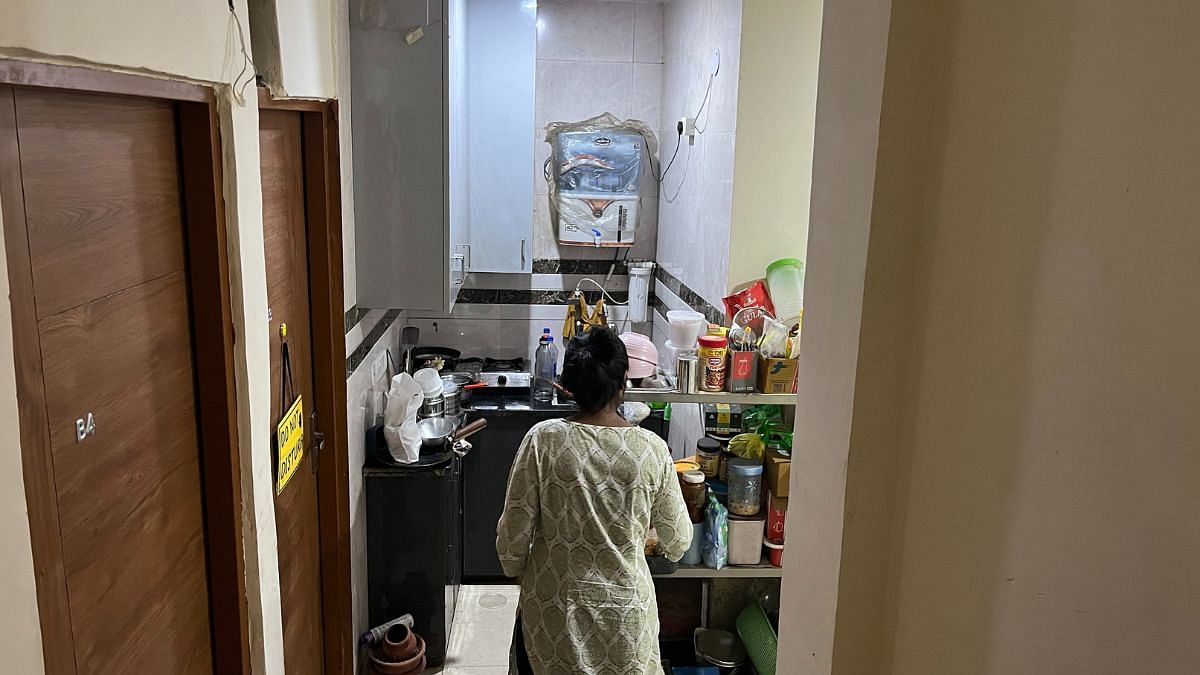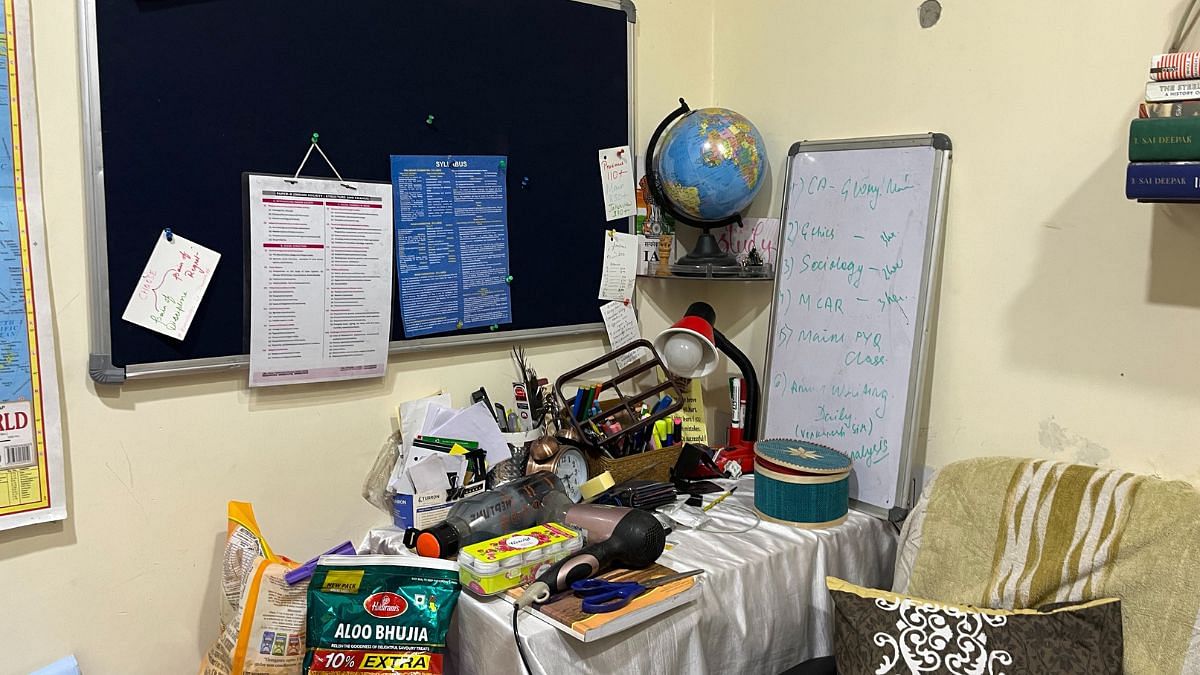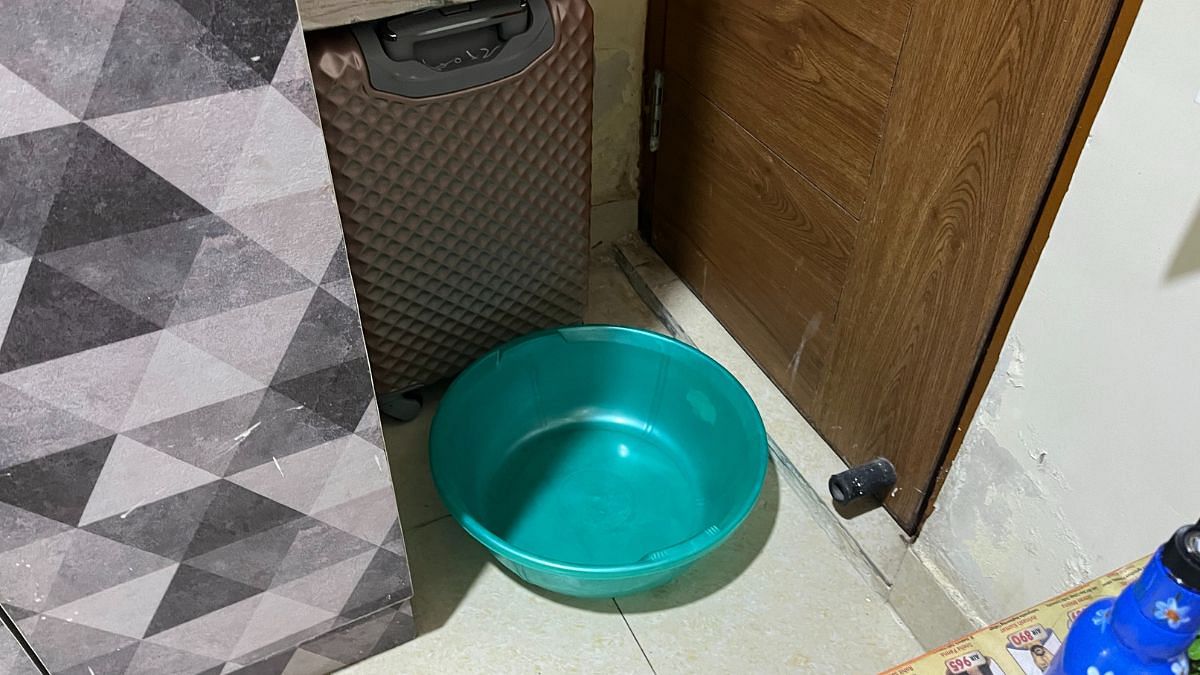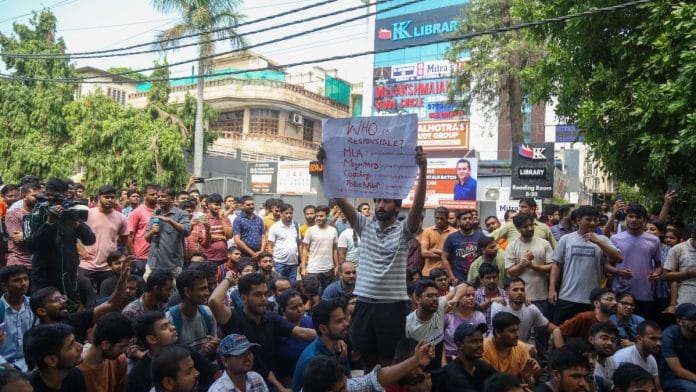New Delhi: When the monsoon arrived this year, 21-year-old Asha’s study time was severely cut short. She spent hours mopping the floor and removing the rainwater that entered her tiny room in the basement. Water flowed in from the staircase, the ceiling, and different corners. She kept little steel containers on the floor everywhere to collect the water. She pleaded with the landlord to fix the problem but he offered no support.
Now, after the deaths of three UPSC aspirants in the library basement of Rau’s IAS Study Circle in Delhi’s Old Rajinder Nagar, which flooded after heavy rainfall, Asha’s anxiety has doubled.
“We are living in fear, after this basement library incident. We are scared for our lives. Something like this could have happened to us,” said Asha, while mopping her floor, which was flooded again on Sunday. This was the fourth time she had cleaned up that day.
For the daughter of a junior government official in Bihar’s Darbhanga, coming to Delhi for UPSC coaching was a big decision for her family. She counts every penny she spends and lives with strict dos and don’ts and precautions. She can’t afford to fall sick and lose study time.
“With rent, food, and study material, my monthly expenses reach Rs 20,000-22,000. But if I get sick it crosses Rs 25,000. I can’t afford that,” said Asha.

The UPSC aspirants’ population is among the creme de la creme of the Indian youth. They embody drive, ambition, and mobility like no other. They spend lakhs of rupees and live in crummy, dank, hole-in-the-wall rented rooms—sometimes packed like sardines. Their anger over the deaths of three students is palpable in every alley of Old Rajinder Nagar—home to around one lakh men and women in their 20s.
The exploitation begins the day an aspirant enters the Bada Bazar lane, where the big coaching institutes are, said a UPSC aspirant.
Their living conditions are in the spotlight now but years of complaints have gone unheard by the mafia-like nexus of coaching institutes, brokers, and landlords. Government authorities have consistently ignored dire warnings.
Just a week ago, an aspirant who was about to write the mains exam died from electrocution. The 26-year-old Neelesh Rai was returning to his room through a waterlogged street when the incident occurred. Three months ago, a fire engulfed one of the hostel buildings in Old Rajinder Nagar. A few months before that, a fire broke out in one of the libraries, but no one was injured. Last year, during a fire incident in Mukherjee Nagar, students were seen jumping from the building to escape.
“An aspirant’s life is just cheap for the authorities. It’s not that such negligence has happened for the first time but now it has become an issue because it took three people’s lives. We go through an extensive process of preparation but from brokers to landlords and coachings to authorities, everyone cheats us in different ways,” said Shiv Kumar, an aspirant protesting in Old Rajinder Nagar.
On Sunday, hundreds of students took to the streets, protesting the deaths of Tania Soni (25), Shreya Yadav (25), and Navin Delvin (28), who drowned in the coaching centre’s basement. “Maut hui hai, mazak nahi, People have died, it’s not a joke” read one of the placards at the protest.
The incident on Saturday got the attention of the nation, with many notable persons posting about it on social media. The Vice President of India, Jagdeep Dhankhar, mentioned the case in his Rajya Sabha address on Monday. He said that he “deems it appropriate to have a short duration discussion or a calling attention” in the house, and will hold a meeting with the leaders of all parties in his chamber on the issue.
At the protest site in Karol Bagh, students demanded to meet the Municipal Corporation of Delhi (MCD) commissioner. On 29 July, the Lieutenant Governor of Delhi, VK Saxena reached there to meet students.
Their voice is disproportionately louder than any other student group in India. Aspirants Vikas Thakur and Sudhir Kishor have swung into action, they shouted slogans on the roads and tweeted photos and videos of the incident. A heavy police force was deployed at the corners of Old Rajinder Nagar. Meanwhile, political parties kept blaming each other.
It’s a sad tale of young desperate aspirants who come to Old Rajinder Nagar and Mukherjee Nagar with nothing more than their parents’ hand-me-down IAS-IPS-IFS dreams and modest savings. Only to be part of a hustle culture of hyper-competitive coaching institutes in tightly packed, impenetrable neighbourhoods with scant scrutiny and safety standards. They operate like an independent exploitative republic in west Delhi that is run by predatory businesses preying on India’s Great IAS Dream.
“The exploitation begins the day an aspirant enters the Bada Bazar lane, where the big coaching institutes are. After taking admission to a coaching institute, the real battle for survival starts,” said 26-year-old Lumbini, an aspirant from Maharashtra who lives in Old Rajinder Nagar and has been preparing for the UPSC exam for the last two years. “Brokers and landlords ask for a lot of money, leaving students with no option but to get trapped in this cycle that has been going on for years.”
Struggle of survival
Every year in June, the Bada Bazar road fills up with people seeking guidance for admission to coaching institutes, followed by house hunting and the gruelling process of finding and moving into a place.
For aspirants, this period is the most crucial time of their lives, as they dedicate their most productive years to preparing for UPSC exams. But for brokers, landlords, and even coaching institutes this is the season to suck as much money as possible out of students.
For brokers, it is just business as usual.
“This is a profession that has been going on for decades. The minimum price for a decent room in Old Rajinder Nagar starts from Rs 15,000 to 25,000. People have built rooms in the basements as well so if someone wants a cheaper option, we show them that. We have never faced any problem. This is purely business nothing else, just like the other profession,” said 32-year-old Umesh Giri, a broker in Old Rajinder Nagar.

In the first year of preparation for the civil services exam, a student spends almost Rs 2 lakh to Rs 5 lakh in coaching fees, Rs 15,000 on rent every month, then there’s food and other expenses.
The minimum rent for a very small and dingy room is more than Rs 12,000, often with shared kitchens and bathrooms. Sometimes, landlords raise the rent mid-year, leaving aspirants with no recourse. When it comes to repairs in the room, landlords start ghosting the tenant.
Almost every time, landlords refuse to return the security deposit. And nobody can do anything about it, said Anshul Kumar.
Aspirants searching for an affordable room to live and study typically get three options: barasti, porta cabin, and basement rooms. These are the cheapest alternatives to regular flats and rooms, which cost more than Rs 20,000. Barsati is a room located on the terrace with a plastic roof. Tenants experience extreme heat, and cold in these rooms, and conditions get worse during the monsoon when rainwater seeps underneath.

“A porta cabin is a jugaad room where the landlord puts a wooden cardboard to make a cabin-like space where students can fit their beds, and if the landlord is generous with the space, then a chair too,” said Amit Kilhor, who taught UPSC aspirants at StudyIQ and lived eight years in Old Rajinder Nagar.
Aspirants struggle the most with security and cash-down money. When a student rents a room, they have to pay one month’s rent in advance, a security deposit equal to one month’s rent, and a brokerage fee, which is half of the rent.
“Almost every time, landlords refuse to return the security deposit. And nobody can do anything about it. It has become the trend here. They know we can’t do anything about it,” said Anshul Kumar who has been living in Old Rajinder Nagar for the last four years. “The security deposit is usually meant to cover situations when the tenant leaves without paying one month’s rent or breaks anything in the room, but even if everything is fine, they don’t give back the security deposit.”
This culture of exploiting students has been going on for years. Students submit to the demands because they want to tie up all the logistics right away and get going with their study classes. Time is the most prized commodity for them.
“Now with this flooded basement incident, this has become a big issue. But the basement was always there and students were living in it. It’s the landlord’s property, they have the right to put up any space on rent. If one student has any problem, then another will move in,” said one landlord of a five-story building in Old Rajinder Nagar on the condition of anonymity.
In the last few years, the number of aspirants has grown rapidly. In 2013-2014, the number of applicants was around 5 lakhs and in 2021-2022 the number doubled to 10 lakhs. With the growing number of aspirants, the quality of infrastructure and facilities declined.
“Over the past decade, the situation has deteriorated significantly. Costs have skyrocketed, while infrastructure and facilities have steadily declined,” said Kilhor. “The student population has surged by three to four times, forcing many to relocate to more affordable but poorer areas like Patel Nagar and Shahdadpur to save money. Food has remained a persistent issue, with many students relying on unhygienic tiffin services for their meals.”
According to a Delhi Fire Services (DFS) audit of 500 coaching centres in the city, conducted after the Delhi High Court took suo moto cognisance of the fire incident last year, only a handful had basic firefighting equipment.
Aspirants—a source of income
No one sees us as human, for them we are just a source of income. No humanity is left in people anymore, said a UPSC aspirant.
From studying for long hours and doing laundry to worrying about exams, there is a never-ending list of things that add stress to an aspirant’s life. Many are living alone for the first time in a new city, away from their families. The process of finding a new room and moving is both time-consuming and costly, taking a toll on an aspirant’s mental health.
“No one sees us as human, for them we are just a source of income. No humanity is left in people anymore. They just exploit us. From coaching institutes to brokers and landlords. There are coaching mafia, landlord mafia, and broker mafia. They only understand money,” said Lumbini.
Delhi has two UPSC coaching institute hubs one in Mukherjee Nagar and the other in Old Rajinder Nagar. The industry is reportedly worth more than Rs 3,000 crore and it is still growing. Aspirants from states such as Bihar, Maharashtra, and West Bengal, and even from the rural and tribal belt come here to study but instead, they have to fight for survival.
“I sold my land to send my son to Delhi to prepare for UPSC but when I see such news where students die just for doing what they were supposed to do makes me sad. Life is more valuable than the IAS dream,” said Sushil Shinde, who lives in Maharashtra.
About a week ago, 26-year-old UPSC aspirant Anjali Gopnarayan ended her life in her rented room in Old Rajinder Nagar. She was distressed after failing the UPSC prelims and was upset about her landlord’s decision to increase the rent from Rs 15,000 to Rs 18,000, which she was informed about just a day before the exam.
Her father is an assistant sub-inspector in Maharashtra’s Akola District. She had come to Delhi on a government scholarship to continue her preparation for the civil services entrance exam.
“The landlord doesn’t care about our health, exams, or anything else. Only money matters to them. Anjali died and it didn’t make any difference to them,” said Lumbini, a friend of Anjali.
Anjali has died but the room she took her life in is washed of her memories and is now ready for a new tenant. The coaching industry must go on. It doesn’t pause for anybody. There will soon be a new ambitious aspirant in her room running on the relentless treadmill of ambition all over again.
“In a week the landlord is showing the room to other people. The cycle of exploitation doesn’t stop, even after someone’s death,” said Lumbini, while protesting with the other students.
(Edited by Ratan Priya)







Not only coaching institute…. Private colleges also treat students as commodities…. They never see the human angle.. Their is a blind race to earn more and more money…. Compromising the education, health and safety of students